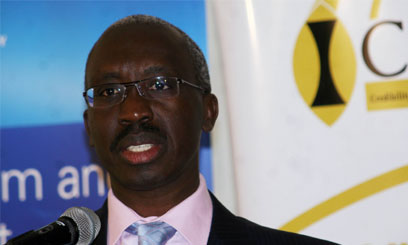
KPMG CEO Josphat Mwaura says there is also need for much effort by the government to review its formula on scrutinizing the performance of ministries/FILE
NAIROBI, Kenya, Jun 15 – The government may in the near future be forced to lay off most of its unproductive workers if it’s to completely manage the rise in the recurrent expenditure.
Economic analysts say the government is forced to pay low salaries to a huge number of employees, who become less motivated, hence the sector remains unproductive.
Tax Partner at KPMG East Africa Richard Ndungu says things may even become tougher with the coming in of the county governments where expenditure will go up due increase of staff and operation cost.
“Let us learn from Greece. You cannot as a country continue on a permanent deficit. It is similar to a company, trading at a permanent loss. And this really is the future for the world. If you do not look after you productivity, who is going to continue financing your deficit,” said Ndungu.
He has called on the government to partner with the private sector for the latter to advise the government on the measures to take in managing expenditure and increase productivity.
“When did the government ever come to the private sector and said; since your CEOs and boards of directors are able to run your companies profitably, we need your help in reforming the public sector. The private sector has enough expertise, to create job descriptions, to conduct interviews, look at the public sector payrolls, salary reviews and make recommendations,” Ndungu added.
KPMG CEO Josphat Mwaura says there is also need for much effort by the government to review its formula on scrutinizing the performance of ministries and government institutions, and do away with those who do not perform at a given particular period.
“What is the capacity of human resource for this ministry, what is the appropriate structure? And then you bring in the performance management and result based management. This is basically a link, between Vision 2030 to the individual civil servant performance,” said the CEO.
He has also called on government to put in place measures that will discourage imports and instead come up with policies that will encourage local manufacturing of goods hence increase economic growth.
“We got about Sh500 billion worth of exports, and we’ve got about Sh1.3 trillion worth of imports. So our import bill is about three times what we are able to export. It results in pressure to the shilling and on our loc al prices.


































